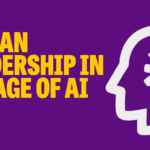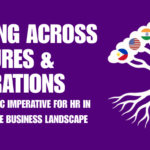In boardrooms around the world, a conversation is unfolding — one that Chief People Officers and HR Directors can’t ignore. As artificial intelligence (AI) transcends its status as a buzzword and integrates deeply into the business fabric, the challenge is how to manage its human impact. This is a critical moment in the global landscape where the focus must shift from the technological capabilities of AI to its implications on people, culture, and organisational dynamics.
AI’s growing influence isn’t just hypothetical. It’s reshaping industries and redefining work roles on a global scale. From automating mundane tasks to sophisticated decision-making systems, AI is a two-edged sword — it promises efficiency and innovation but brings complex challenges in workforce management.
Why AI Needs Your Attention Now
For HR leaders, the urgency around AI centers on more than just keeping up with technology. It’s about maintaining a competitive advantage while ensuring the well-being of employees. As automation grows, there’s a tangible pressure to reskill the workforce and address fears of job redundancy. These challenges are not confined to any single region; they are a global phenomenon affecting both advanced and emerging economies.
Increasing regulatory scrutiny concerning AI and data privacy demands that HR leaders act not only as talent strategists but also as ethical stewards. How do you ensure that AI supports diversity, equity, and inclusion rather than undermining it? These are questions that demand thoughtful engagement and proactive solutions.
The Human Impact: Real-world Challenges
In the buzzing ecosystem of a business environment, AI’s human impact reverberates in ways that demand HR’s direct intervention:
- Reskilling and Up-skilling: Automation’s rise necessitates retraining programs that help employees stay relevant. The focus here should be on continuous learning and adaptability, ensuring employees feel valued and future-ready.
- Culture and Morale: Navigating change without affecting workplace culture is tricky. As AI takes over certain tasks, it’s crucial for HR to keep employee morale high, preventing a negative perception of AI as a ‘job-taker’.
- Emotional and Ethical Considerations: In the pursuit of efficiency, the emotional well-being of employees can sometimes be overlooked. Additionally, the ethical deployment of AI, such as avoiding biased algorithms, is a major concern that HR must tackle.
AI Across the Talent Lifecycle
To meet these challenges, HR leaders need to understand how AI is reshaping not just work — but the entire talent journey. At Let’s Talk Talent, we break this down into three interconnected stages:
Get: Redefining Talent Acquisition
AI is transforming how companies attract and identify the right people — but without the right guardrails, bias and depersonalisation can creep in.
- Challenge: AI-powered recruitment tools can speed up shortlisting, but may unintentionally reinforce bias if left unchecked.
- Opportunity: Use AI ethically to enhance candidate experience, not eliminate the human touch.
- Case study idea: Accenture reported a 50% increase in female leadership roles within five years of deploying inclusive job descriptions and targeted AI screening.
Keep: Elevating Engagement & Experience
Once talent is in the door, the priority shifts to creating a culture where people thrive — and where AI supports, not sidelines, employee wellbeing.
- Challenge: Automating people processes (e.g., pulse surveys, performance feedback) risks turning engagement into a tick-box exercise.
- Opportunity: Use AI insights to personalise employee experiences and proactively support mental health and inclusion.
- Case study idea: Unilever were able to reduce cases of burnout by implementing data insight from Microsoft Viva to spot patterns in calendar usage, email volume, after-hours activity and collaboration.
Grow: Reskilling and Career Development in an AI Age
AI is changing the nature of work — and with it, the skills people need to succeed.
- Challenge: A growing capability gap threatens future workforce readiness.
- Opportunity: Use AI to map future skill needs and create personalised development pathways for every employee.
- Case study idea: Salesforce launched Career Connect in 2024, and AI-powered internal talent marketing place, which increased internal mobility across the board and resulting in 50% of all vacancies in Q1 2025 being filled by internal movement.
Strategic Solutions: Supporting Your Organisation’s Transformation
At Let’s Talk Talent, we specialise in helping organisations navigate change with confidence, ensuring teams remain engaged, aligned, and ready to perform. Whether you’re reshaping your organisational structure, redefining your culture, or implementing a new strategic direction, we provide the expertise and tools to make change work for you and your people.
To effectively manage the human impact of AI, HR leaders can leverage several strategic approaches:
- Incorporate AI into HR Functions: Use AI-driven tools for employee engagement, talent acquisition, and performance management. These can streamline HR processes while providing deeper insights into your workforce.
- Develop a Comprehensive AI Strategy: Integrate AI goals into your organisational vision. Look beyond immediate benefits and consider long-term impacts on jobs, roles, and skills requirements.
- Engage in Transparent Communication: Maintain an open dialogue with employees about AI implementations. Clearly communicate how AI will assist rather than replace their work, highlighting new opportunities for growth and learning.
- Ethics and Governance Frameworks: Develop and implement ethical guidelines to oversee AI usage. Ensure algorithms are regularly audited for fairness, transparency, and accountability.
Practical Tools to Foster AI-Positive Environments
To support your HR journey in these transformative times, Let’s Talk Talent offers practical tools designed to empower leaders and foster a human-centric AI integration:
- The HR Professional’s Organisational Design Playbook: If you’re in need of advice, ideas, and inspiration for your organisational design project, download our guide to building your strategy today! This playbook will help you craft structures that cleverly incorporate AI without losing sight of the human element.
- HR Strategy Whitepaper: Gain early access to our newly updated HR Strategy Whitepaper, offering forward-looking insights to help you align your people strategy with emerging workforce trends and AI transformation.
- Workforce Planning: Implementing AI effectively demands a robust talent management strategy. Our services will ensure you’re not only equipped to manage current talent but also to strategically attract potential candidates that align with your future AI goals.
Explore more ways we can support your global team here: Change & Transformation
Collaborative Adaptation: Moving Forward Together
The conversation surrounding AI doesn’t have a simple conclusion, nor is it a solitary journey. For CPOs and HR Directors, the path is one of collaborative adaptation, requiring robust partnerships and networks.
Carrying forward this dialogue, Let’s Talk Talent provides resources dedicated to blending AI’s capabilities with human insight:
- Create Cross-functional Teams: Encourage collaboration across IT, HR, and business units to foster a culture where AI is viewed as an enabler, not an adversary.
- Invest in People-Centric AI: Where AI solutions can learn and evolve, it’s crucial that HR ensures these systems are trained with people-centric purposes in mind.
Offering a framework to navigate AI’s impact isn’t merely about managing pressures; it’s about leveraging opportunities. Together, let’s build an innovative, inclusive, and forward-thinking future.



